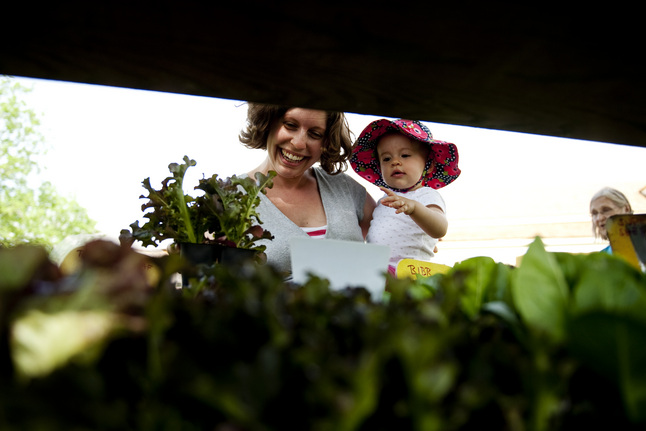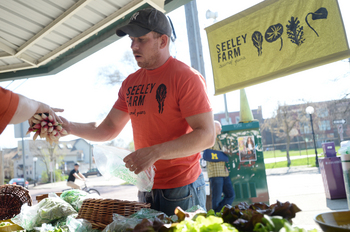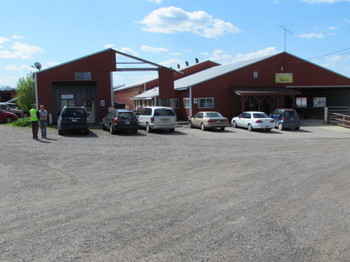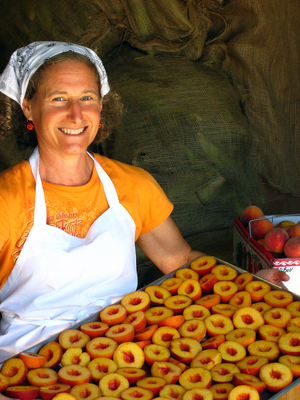Clik here to view.

Ann Arbor residents Karen Ellis and one-year-old Veronica Ellis browse the selection May 21 at the Frog Holler Farm table at the Cobblestone Farmers Market.
Daniel Brenner I AnnArbor.com
About 10 years ago, there were about four community supported agriculture farms in Washtenaw County. Now, there are more than 35.
Small growers in Washtenaw County mostly sell their produce directly to consumers through farmers markets or in community supported agriculture agreements.
“People are building a direct relationship with other people that want food,” said Richard Andres, an owner of Tantre Farm, which grows organic produce and produces organic dairy products on about 40 acres of property in Chelsea.
Small farms comprise 91 percent of all farms in the U.S. -- and most of the growth from 2002 to 2007 in small farms were among those that had annual sales of less than $10,000, according to the most recent data from the U.S. Department of Agriculture.
In Washtenaw County, the average size of a farm decreased by 4 percent from 2002 to 2007, while the market value of products sold increased by 34 percent during that time frame.
Organic farms have higher average annual sales than the average of all farms, according to the USDA.
The increasing presence of small local farmers has resulted in an expansion of new farmers markets and a plethora of choices for people to choose from when selecting a CSA.
Clik here to view.

Seeley Farm farm manager Pete Cacciari helps a customer with a radish purchase at the Ann Arbor Farmers Market on the first Wednesday morning market of the season May 1.
Farm-to-table restaurants are increasing in prevalence as well.
“So many more (restaurants) are seeking out local food and they’re willing to do the work,” Andres said.
However, small farmers are often limited when it comes to their ability to move their business to a larger scale.
Rena Basch is the owner of Locavorious, a business that freezes local produce and sells it through a CSA.
“The bottom line right now is that local versus non-local still means small versus large,” Basch said. “We have the same barriers as any small manufacturer of any kind of thing it’s hard to make that transition from small to large — for local food it’s no different.”
Major institutions like the University of Michigan and St. Joseph Mercy Hospital in Superior Township -- which are looking to add more local products in its supply chains -- require a streamlined system for ordering mass quantities -- which small farmers often are not able to provide.
“There’s infrastructure that we need to put in place to help those businesses meet that demand,” Meissner said. “We have a lot of local produce, but we don’t have processing facilities to wash, chop and package.”
That infrastructure includes processing facilities and commercial kitchens to help small growers package their products for sale -- and to aggregate produce and goods to be able to fill the large orders of big institutions.
Meissner said a potential option would be to have multiple growers share ownership of such facilities.
Clik here to view.

The Washtenaw Food Hub property in Ann Arbor Township.
Courtesy Washtenaw Food Hub
The hub is the recipient of state-allocated grant funding, and Andres said he’s applied for three additional grants.
The facility would allow growers to briefly store their fresh food so it can be distributed to more outlets -- including more urban areas lacking the availability of local produce and products, Andres said.
Entry into local food markets is difficult, especially for small farmers, according to a January report by the U.S. Department of Agriculture. Food hubs can help lower entry barriers into the local food system and strengthen rural economies, according to the report.
Dealing with the USDA's organic certification process, as well as state and local regulations, is often complicated for small farmers whose innovative methods of distributing their goods don’t fit in to the established channels.
“Small businesses are going to want to do something that you’ve never thought of yet and the regulatory bodies are slow in responding,” Basch said.
Basch said the spirit of collaboration amongst many small growers in the county is alive and well, albeit often under the radar: Sharing equipment and facilities is something Basch said she does with her own operation.
Collaboration and cooperation now appear to be the wave of the future for the local food movement in Washtenaw County -- and the county government has taken an active role in determining how to best help the small food businesses be successful.
Washtenaw County Office of Community & Economic Development has funded a $4,900 study to develop a clearer picture of our local small businesses and entrepreneurs and understand how best to help them achieve their potential.
“We have some great systems in place in terms of consulting, advising: Lots of places for a small start-up to grow -- but what we don’t have a lot of is direct operational support,” Meissner said. “(Small business owners) often are very highly skilled at something, but they aren’t necessarily managers and analyzers. Often they don’t have the data they need to make good business decisions.”
Based on the initial responses from the survey -- which closes to responses Friday -- many small growers are interested in collaborating to share facilities as well as back office support, including marketing and financial advice.
Clik here to view.

Rena Basch
Courtesy of Locavorious
Basch said she’s also looking to expand the geographic reach of Locavorious’ distribution.
Participation in the county’s study has helped Basch consider other methods of collaboration for Locavorious, she said, especially when it comes to cooperative ownership of kitchens, processing facilities and shared back-room administrative staff.
“The goal is to establish a cooperative that would serve small businesses and entrepreneurs, and to help launch other collaborative projects,” Meissner said. “We have incubators for tech companies, but we don’t for small businesses in other arenas.”
Strong support for tech companies in Ann Arbor has left small farmers like Basch feeling unrecognized for some time.
“I appreciate that there’s finally some recognition in this area,” Basch said. “I think there’s some other small-scale operations that SPARK isn’t supporting. This food system is one that’s outside the realm of technology and I think it’s great that the county took the initiative.”
More than 80 percent of the small businesses in Washtenaw County are microenterprises of five employees or fewer, Meissner said.
Net employment gains tend to come from hiring by startup companies and small businesses, Meissner said.
“The economy of Michigan has historically been ravaged by corporate industry,” Andres said. “Now that they’ve left we have a pretty desolate situation here. We have cities that can’t generate anything for themselves.”
Meissner said co-ops and collaborative models for small farmers and associated food system businesses are ways to make local programs more independent.
“We need to start looking for models that are sustainable on their own that promote a healthy, diversified economy that don’t depend on subsidies I’d love to see us put our own economic development in the hands of our community,” Meissner said. “We need to find ways to be able to sustain it regardless of the political winds that bring funds.”
Amy Biolchini covers Washtenaw County, health and environmental issues for AnnArbor.com. Reach her at (734) 623-2552, amybiolchini@annarbor.com or on Twitter.